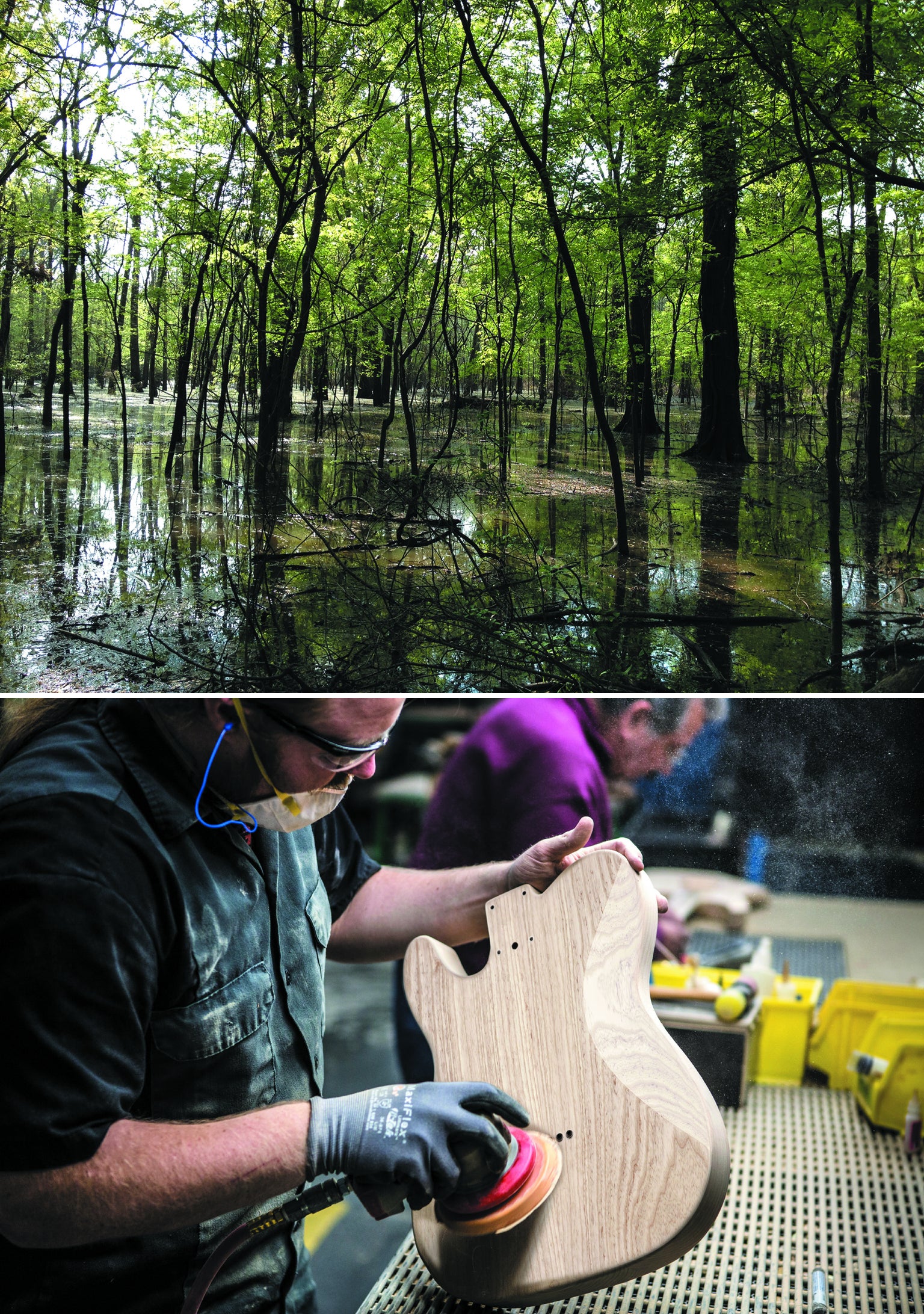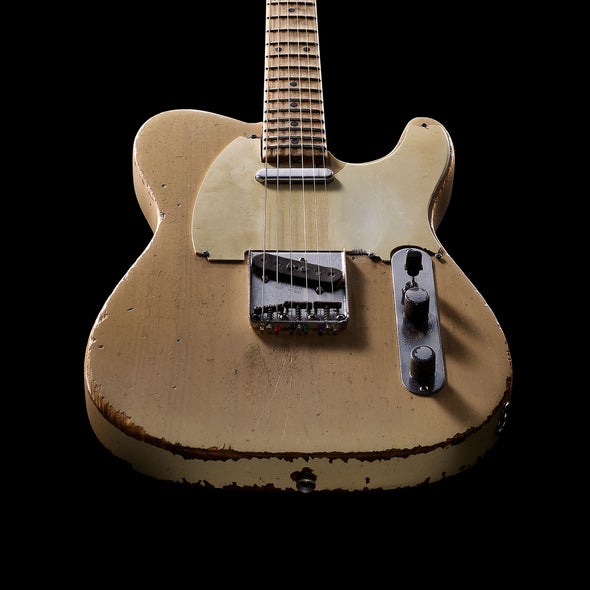Every winter and spring, rains across the central U.S. combine with snowmelt along the northern reaches of the Mississippi River to inundate the hardwood-dominated bottomlands of the lower Mississippi. When the floodwaters recede and soils dry up in summer, logging crews move in. One of their targets has been swamp ash. These wetland trees have thin-walled cells with large gaps between them, creating a low-density wood—and some say a special sound—that has made it the material of choice for some of the most famous guitar players in rock and roll.
Starting in the 1950s, iconic guitar maker Fender Musical Instruments embraced this type of ash. Bluesman Muddy Waters, rockers Keith Richards of the Rolling Stones and Chrissie Hynde of the Pretenders, and other music legends have loved their Fenders; many say this wood gives the instruments a warm but crystal-clear twang. Swamp ash—also called “music ash” or “punky ash”—is primarily green ash, but the term can encompass other species that grow in bottomlands, such as black ash and white ash. The wood became an integral part of Fender's DNA over the decades, says Mike Born, former director of wood technology at the U.S. company, and it once was cheap and readily available.
But last year an acute shortage forced Fender to announce it would move away from using swamp ash in its famous line of Stratocasters and Telecasters—reserving the wood for high-priced vintage models only. Fender blamed the dwindling supply on longer periods of climate-fueled flooding along the lower Mississippi—which is endangering saplings and making it harder for lumber companies to reach standing trees—as well as the looming threat of an invasive tree-boring beetle. Another renowned U.S. manufacturer called Music Man raised similar sourcing concerns in 2019, which the company described as having “one of the worst harvests in recent history.”
The ominous situation shows how climate change consequences can reverberate through all aspects of society—even rock and roll. And the swamp ash supply could soon become still more tenuous because experts expect global warming to continue to make floods worse. “The average player just won't be able to afford it,” Born says.
Inundation and Invasion
In the lower Mississippi River, these trees are capable of enduring seasonal flooding. As soon as the bottomlands are dry enough, logging crews set out to harvest the timber. “Once the river goes back within its banks, the ground is just as safe to cross with heavy logging equipment as a Walmart parking lot,” says Norman Davis, former president and a current adviser for Anderson-Tully Lumber in Vicksburg, Miss. The company was once Fender's biggest supplier of swamp ash, Davis notes, but increasingly intense flooding events have made things difficult. “The bottomlands have been pretty much inaccessible the past two and a half years,” he says.
Between June 2018 and July 2019, the U.S. experienced its 12 wettest months on record, according to the U.S. National Oceanic and Atmospheric Administration. The agency found that the 2019 spring floods along the Mississippi were among the most damaging in modern history. And a 2018 study in Nature showed the area's flooding has become more frequent and severe over the past 150 years. “We've got intense rainfall from climate change that's increasing the amount of water going into the river,” says Gerald Galloway, an expert on Mississippi River hydrology and a civil and environmental engineering professor at the University of Maryland, College Park. And an expanding system of dams, walls and levees—originally intended to prevent floods—may instead be making the situation even worse.

Green ash, one particularly prized swamp tree, is a fast-growing species, and it has adapted to seasonal flooding. But lengthening periods of high water can still mean trouble, especially for seedlings. “If you're talking about an early-growing-season flood that flushes out in a couple of weeks, it's not really a problem for ash,” says Brady Self, a forestry specialist in bottomland hardwoods at the Mississippi State University Extension Service. But they are not geared to withstand year after year of long-duration floods. “If the water stays on for months, at a time when the seedlings just don't have their heads above the water, they might have trouble surviving,” Self says. Lee Jones of J. M. Jones Lumber Company in Natchez, Miss., says he has witnessed some damage. “The river has been up for so long, and for so much, that it's killed a lot of the trees,” he says.
Another threat is also lurking: the emerald ash borer. The larvae of this invasive beetle, native to Asia, tunnel through wood and disrupt trees' ability to transport water and nutrients. Since it was first spotted in this country (in Michigan in 2002), the pest has spread to 35 U.S. states and five Canadian provinces and killed millions of native ash trees. “I think it's the most rapid-spreading insect we've seen attacking trees in the U.S.,” says Jennifer Koch, a U.S. Forest Service biologist.
The emerald ash borer has not reached the lower Mississippi floodplains, but Koch says “it's only a matter of time” until the beetle does so. Aware of this threat, several lumber companies started harvesting any adult swamp ash trees they could find in areas selected for annual logging in 2015. Previously, they would limit the take to about 30 percent of adult ash trees in those designated spots. Koch says the decision makes sense under the current circumstances, although it leaves fewer trees for the future.
A Player's Pick
Fender's announcement about moving away from ash has triggered some dismay in the guitar world. For Richie Kotzen, who rose to fame decades ago with the heavy metal bands Poison and Mr. Big, the ramifications are personal: he recently learned that his signature Fender guitar models, crafted with swamp ash bodies since the 1990s, will now need to be made with a different type of wood. “Many years ago I had decided what my favorite woods were on a guitar. I learned that I liked a swamp ash body with a maple neck, and I stuck with it,” he says. “Now I'm going to have to figure out a replacement wood for ash.”
There are a handful of options, including red alder, which is native to North America's West Coast. Since the late 1950s Fender has used alderwood to make less expensive versions of many of its swamp ash guitar models. But many aficionados think ash wood's blond hue and open grain make for a prettier-looking instrument—and for nuanced differences in sound tonality that set it apart from alderwood. “Ash has a very fast attack. Think of a bright clap,” says Brian Swerdfeger, vice president of Fender's guitar R&D wing. “Alder has a warmer, softer attack. Still a clap, but it's rounder.”
Koch and other researchers are also trying to breed green ash (and other ash species) that might resist the emerald ash borer and replace disappearing tree stands. The project will take decades, but with climate change continuing largely unabated, future flooding problems in the bottomlands are unlikely to wane. The plight of the trees troubles musicians as well as scientists. “I can adapt to a new wood,” Kotzen says. “But I'm much more bothered by the environmental issue.”
The area of the Mississippi River near where Jones's and Davis's companies log receded this past summer, and logging crews have returned to the bottomlands. The region's ash will remain a precarious commodity in the foreseeable future, however. “There's great demand, but I don't think we're going to have much punky ash to sell,” Jones says. “There just aren't as many trees left.”
Because it may get harder for future generations to lay their hands on swamp ash Fender guitars, music fans may have to content themselves with the wood's legacy—perhaps by cranking up the Stairway to Heaven solo that Led Zeppelin's Jimmy Page shredded on his swamp ash Dragon Telecaster.



